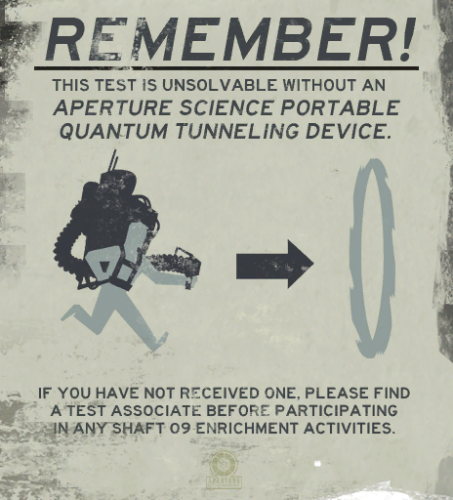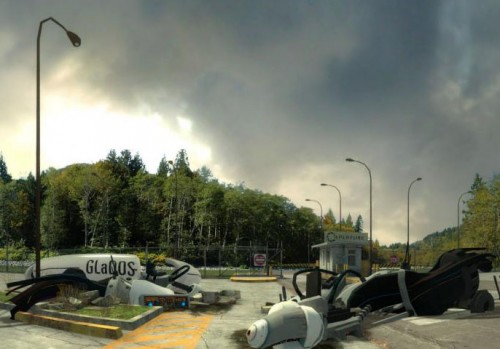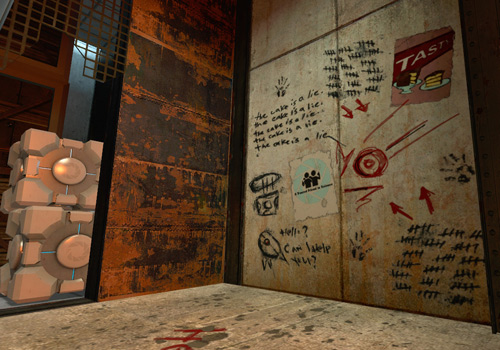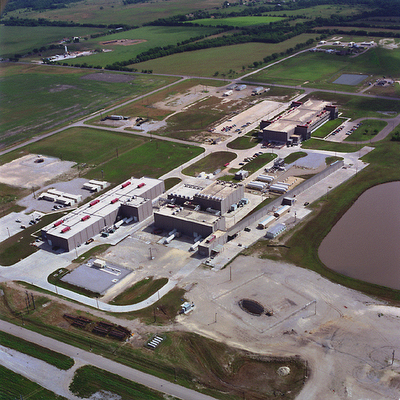NOTE: Location is approximated.
Post World War II era America experienced a golden age in science. Driven by necessity scientists unleashed the raw power of the atom. The Soviet launch of Sputnik sparked a race to send man to the moon. To maintain intellectual superiority during the Cold War the US government contracted with many private science companies to make wild dreams a reality. It was companies that dared to dream big, like Aperture Science, that brought those scientific innovations into American lives. Exploring the abandoned Aperture labs was an urbex adventure unlike any other. Before delving into that, an examination of Aperture’s history is in order.
In 1943 a tenacious entrepreneur by the name of Cave Johnson started a small business called Aperture Fixtures, which developed shower curtains. Johnson’s innovations in shower curtain technology propelled the young startup into financial security seemingly overnight. The next year Cave Johnson purchased a salt mine in the Michigan Upper Peninsula to be the headquarters for Aperture Fixtures.
The enigmatic Johnson applied his scientific principles to shower curtain production with great success. In 1947 the company renamed itself Aperture Science Innovators and were awarded the Best New Science Company Award that same year. Within two years time the company placed #2 on the list of Top 100 Applied Science Companies by the Mechanical Engineering World Journal. After a decade of operating as a private company, Johnson takes Aperture Science Innovators public in 1953. The Eisenhower Administration took notice of the innovative company and contracted with them to produce shower curtains for all branches of the US Military, with the exception of the Navy. The government contract provided Aperture with enough capital to support numerous ventures outside of shower curtain research and development.
The salt mine upon which the Aperture headquarters was constructed extended some four kilometers into the ground at the time when Johnson acquired it. Behind the scenes Aperture was dabbling in more than just shower curtains in the depths of the earth. The first of multiple underground facilities were built around this time, one of which was dubbed Test Shaft 09. It was here that Aperture began flexing their scientific prowess. One such development was a dietetic pudding substitute comprised of non-toxic fiberglass insulation, otherwise known as repulsion gel. Another prolific development was the Aperture Science Portal Quantum Tunneling Device, a.k.a. the Portal Gun. When shot the Portal Gun renders two linked portals, one orange and one blue, through which matter can pass through instantaneously.
Photo (source): An old poster showing an early version of the Portal Gun.
In the depths of Test Shaft 09 the company built test chambers to put their innovations through the ropes. Astronauts, war heroes, and olympians were recruited by Johnson to navigate each test chamber. Every unique test chamber required a combination of intellectual and physical skill to navigate with the assistance of the Portal Gun. Many tests subjects succumbed to massive injury and/or death despite their enhanced natural capabilities.
The 1960’s were not as prosperous as the previous decade for Aperture. A number of products stuck in the development stages and product recalls issued for health and safety violations stifled company profits. While the company was under intense scrutiny for the recalls, Johnson ordered that Test Shaft 09 be sealed off in 1961 to conceal early unethical scientific projects. The US Senate called in Johnson for a hearing in 1968 to address missing astronauts that had participated in Aperture experiments in the 1950’s. Later that year Aperture filed for bankruptcy. An embattled Johnson attributes the company’s misfortune to corporate espionage by competing rival Black Mesa.
With its reputation tarnished, coffers emptied, and company survival in the balance Johnson resumed operations in Test Shaft 09. Unable to financially persuade society’s intellectual elite the company recruited homeless people with the promise of $60 cash for participating in testing. It is reported that Johnson showed little restraint when it came to his disdain for the quality of homeless test subjects.
Paranoia permeated throughout Aperture as Johnson became more unstable during the 1970’s. Staff were instructed to immediately report sightings of inspectors from a myriad of government entities. The quality of test subjects also broadened to include those on the fringes of society; orphans, elderly, and psychiatric patients.
Eventually the strong focus on scientific development displaced Aperture’s original goal and production of shower curtains ceased. During this period several test chambers were constructed to test the development of the new propulsion gel, the counterpart to repulsion gel. An accident in 1974 where Johnson was exposed to mercury greatly impacted his health, and appears to have amplified his mania. One particular memo from the corporate BBS gives clear insight into Johnson’s delirious shift.
Science is built on three pillars. Pillar one: Science without results is just witchcraft. Pillar two: Get results or you’re fired. Pillar three: if you suspect a coworker of bein’ a witch, report them immediately. I cannot stress that enough. Witchcraft will not be tolerated.
On the surface Johnson’s ramblings appeared to be insane, but it certainly motivated Aperture employees. Johnson’s health continued to spiral with Aperture’s fortune as the company limped along into the 1980’s. Working conditions degenerated to the point where Aperture employees were required to participate in testing. Despite facing an impending financial meltdown, the company somehow acquired $70 million worth of lunar materials to further develop the gels it had discovered. Prolonged exposure to lunar dust badly damaged Johnson’s lungs and caused his kidneys to fail. Senility gripped the Aperture founder as he approached death. During this time he developed a program to revitalize the company.
The three-tiered R&D program consisted of the following initiatives.
- The Heimlich Counter-Maneuver – A method for choking people to insure death in the event of the Heimlich being performed on them.
- The Take-A-Wish Foundation – An agency that finds dying children, takes a wish away from them, and redistributes the wish to a healthy adult for which he will start doing resistance band workouts to improve his vascular health.
- Further Development of the Portal Gun – A means to further shower curtain development.
The first two tiers of the program proved to be a public relations nightmare. As a result, Johnson was summoned before a Senate committee to respond to the rash of choking and sick children deaths. Thanks to now unsealed records we now know that at the meeting Aperture was secretly awarded a contract to continue developing the Heimlich Counter-Maneuver, which gave a much needed lifeline to the flailing company. Johnson’s health conditions, however, led to his death in 1982.
After Johnson’s passing company focus turned towards the development of the Portal Gun. Development hastened the expansion of the Aperture Science Enrichment Center well into the 1990’s. Concurrently an internal software program called GlaDOS accelerated the Portal Gun development pace. In its initial stages GlaDOS ran the companies computerized BBS, but by the mid-1990’s it had progressed to the point of achieving sentience. Experiments with artificial intelligence are known to have continued at the Enrichment Center into the early 2000’s.
Photo (source): Debris in the Aperture Science parking lot.
Aperture Science was built to be self-sufficient, underground, and deeply secluded from civilization. No one is certain when the already sparse activity at the only known Aperture Science checkpoint station ceased entirely. Visible debris on the surface of the checkpoint indicates that a massive explosion once rocked the facility. Debris and concrete had the unmistakable charcoal black veneer of fire damage.
It was with great trepidation that I entered the chasm that exposed an entry to the Enrichment Center as the sun was rising above the tree line. Adrenaline coursed through my veins as I met a familiar rusted industrial facade similar to other urbex locations I have explored. An endless array of pipes, fans, pistons, stairwells and precarious gangways alluded to a powerful internal machine. Progress through the maze-like support structure was slow going and arduous. Other than the dim light cast off by the occasional dangling fixture the path was cloaked in darkness. The path was comprised of mostly piercing black, rusty red, and glowing orange over the industrial facade. Each turn was carefully marked to insure egress when the exploration concluded.
One of the gangways eventually led to a door, which behind it was an observation room with a giant glazed window. The observation room included a few monitors connected to computers that appeared to be in stand-by mode. Clipboards on the desks held fast to notes with indecipherable scribbles referring to test subjects. It was then that my senses were shocked by the stark contrast of the environment that was barely visible through the glazed window. Normally I would not consider causing damage to an urbex location. On account of the severe isolation, energy already expended, and photographic potential I decided to break the window.
Through the window was a near pristine testing environment in which the observer’s must have viewed subjects. The walls, ceiling, and had a certain geometric and scientifically sterile aesthetic about them. On the wall near the main entryway to the room was a giant white sign with a number and a number of smaller danger warnings. Some of the warnings seemed comical in nature, which only heightens my curiosity as to what exactly Aperture was testing.
After exploring the vacant space of the testing chamber I proceeded to crawl through a break in one of the panels. It seemed odd that the panel had an Aperture branded mechanical arm to adjust the panel behind it. Again I was met with the gritty industrial facade as I slowly made my way around the exterior of more testing chambers. Some testing chambers I could only peer into as no viable means of exit was visible. In the darkness of some areas I could see bright red lines of light. Afraid of intentionally setting off a still active alarm system I steered clear of the red lights. While venturing deeper into the facility I came across the familiar markings of another urban explorer who apparently spent a great deal of time in the facility.
Photo (source): A previous urban explorer/graffiti artist left their mark.
Without natural external cues I lost track of time. I had made my way through most of the food and water supplies I carried with me. My legs felt as through they would soon rebel against me. Fatigue, disorientation, and darkness increase the chances that even the most seasoned urban explorer will have an accident. It was already late when I decided to turn around and head back to the surface. A clear night sky with a full moon was a welcome sight as I left the Aperture grounds.
The story of Aperture, its dramatic rise and inglorious downfall, is one of the most engaging histories of an urbex location that I have every researched. I have tried in vain for some time to contact any Aperture employee who worked at the Enrichment Center. If you have information regarding activities that occurred at the Aperture Science Enrichment Center please contact American Urbex. If you survived the explosion and are still alive, I certainly would like to hear your story as soon as possible.
I must also stress to readers of this article that I will not divulge additional information regarding this urbex location. All requests will go unanswered.
Resources:
Aperture Science – Official homepage for the rogue laboratory.
Combine OverWiki – A comprehensive history of Aperture Science.
Combine OverWiki – Bio information on company founder Cave Johnson.
Game Informer – A brief history of Aperture Science.
Think With Portals – Official homepage for Portal 2.
YouTube – Aperture recruitment video for the Portal Project.



